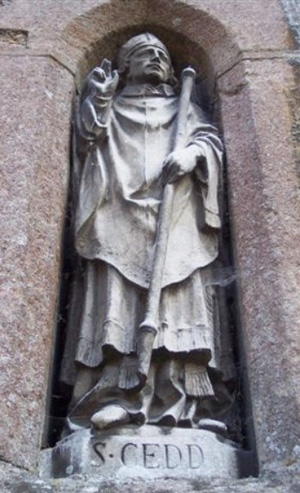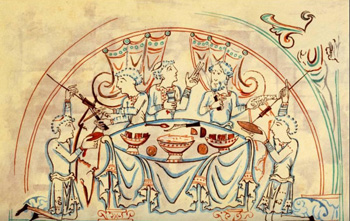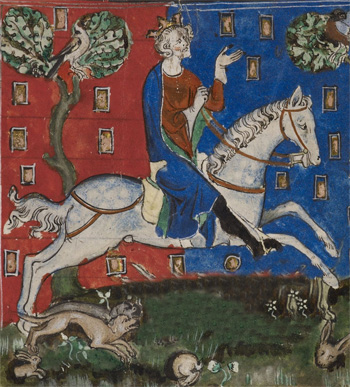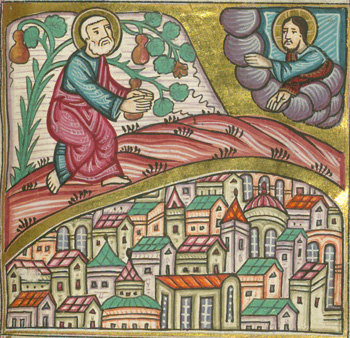Feasts of Our Lord
 |
 |
 |
 |
 |
 |
 |
St. Cedd - October 26
Biographical selection:
St. Cedd (c 620-664) was a missionary Bishop from the Kingdom of Northumbria who was sent to evangelize the East Saxons when the Church was establishing herself in England.
 The following fact is recounted in his life by Bede: The King of the East Saxons, Sigeberht the Good, had decided to become Catholic and to reconvert his Kingdom. He was a good friend of St. Cedd, who had baptized him. The Saint had excommunicated a certain Count who was in an unlawful and scandalous marriage and had forbidden all the faithful to enter the sinner's house and to eat with him.
The following fact is recounted in his life by Bede: The King of the East Saxons, Sigeberht the Good, had decided to become Catholic and to reconvert his Kingdom. He was a good friend of St. Cedd, who had baptized him. The Saint had excommunicated a certain Count who was in an unlawful and scandalous marriage and had forbidden all the faithful to enter the sinner's house and to eat with him.
King Sigeberht did not obey the order and continued to visit the man's home. One time, invited by the Count, the King entered the Count's castle with great pageantry. As he was leaving, he met the Saint. Both were mounted on their horses and dismounted to salute one another.
The King, touched by the gaze of St. Cedd, realized his fault and prostrated himself before him to ask forgiveness. St. Cedd, staff in hand, told him: "Since you do not refrain from entering this castle, you will die here."
In fact, shortly afterwards, the Count assassinated Sigeberht and his brother in that very place. Bede asserts that the King's subsequent murder in 660 was his punishment for defying St. Cedd's injunction.
Comments of Prof. Plinio:
The report is astonishing because it is normal to think that this story will end in a beautiful scene where the King, moved by the gaze of the Saint, prostrates himself before him, asks forgiveness and receives it, and then everything is finished in the best of worlds. But, in the plans of Our Lady things often do not end in the best of worlds. Divine Providence at times chastises and strongly punishes, along with the mercy It gives.
 You saw what happened. The King was converted by St. Cedd from Paganism. The Saint was the local Bishop and the King was his friend.
You saw what happened. The King was converted by St. Cedd from Paganism. The Saint was the local Bishop and the King was his friend.
However, a man leading a scandalous life, a Count, invited the King to dinner at his castle. The Saint had forbidden all Catholics to go to that castle because it was a place of concubinage. It was, therefore, a place similar to a house of prostitution, and an honest and clean person cannot step into a place in such conditions.
The King did not obey the Saint's prohibition. Then, as he was leaving the castle to return home, he met the Saint. Both were riding their horses. Both dismounted to salute one another. It is a beautiful gesture of courtesy.
The Saint got off his horse to salute the King because he was the Head of State. The King also dismounted because St. Cedd was the Head of the Diocese. The Saint represented the spiritual power, which is intrinsically nobler than the temporal power. The two greeted one another and the Saint gazed at the King. And since countless things can pass in a gaze, the King, his conscience sullied, saw the evil of his action. The selection says that the King prostrated himself before the Saint, acknowledged that he had gone astray and asked forgiveness.
 Then St. Cedd touched him with his staff and gave a forewarning. It is evident that he gave this warning so that the King might avoid it, but this is not what happened.
Then St. Cedd touched him with his staff and gave a forewarning. It is evident that he gave this warning so that the King might avoid it, but this is not what happened.
The Saint said: "Since you did not refrain from entering this castle, you will die here." If the heart of this King had not been hardened, if he had not been obstinate in his sin, he would not have returned to that castle and would not have been punished.
But he paid no attention to the Saint's warning, and thus he was murdered there. He was killed by that bad man whom he continued to befriend despite St. Cedd's warning. He preferred the friend of perdition to the friend of salvation.
The warning meant "You will be killed in the state of sin." He did not pay heed to the warning and returned to that castle. He embraced perdition and died. Could it be that at the last moment, through the prayers of St. Cedd, he repented? These are the secrets of God, but we must say that we cannot presume that is what happened.
Someone could object: "This is different from what is written in the selection. The Saint told the King: 'If you return you will be killed.' It is a type of forewarning that seems a certain fact: "You will go back to this castle and die there."
I respond: This is not what happens with forewarnings given by Saints. We can find examples in the Old Testament more than once. A prophet goes to this or that sinner, or even to a city such as Nineveh, and says: "You will be destroyed." In fact, Prophet Jonah told the population of Nineveh that it would be destroyed. It was a forewarning. But then Nineveh repented and was not destroyed.
 Jonah complained to God, saying, "How can this be? Thou didst tell me that the city would be destroyed…"
Jonah complained to God, saying, "How can this be? Thou didst tell me that the city would be destroyed…"
God answered: "It is natural. The people listened to your prophecy and Nineveh repented."
With St. Cedd the opposite happened. The Saint told the King, "You will die if you do not stop sinning." He did not listen to the warning from God, apostatized and died. In this case the warning had an unhappy ending, but it was not a given fact. The King could have converted as Nineveh did.
Can we apply this to our spiritual life? Of course! How many times have we been warned about this or that sin, infidelity or bad action. We do not listen and continue on the same path.
Thus we should be prepared to receive the consequences of our bad actions: the death of the body and the death of the soul, which is sin.
If we die in this condition we will go to Hell. Traffic accidents happen all the time; the newspapers are filled with such stories. Reading these reports, do we think about how many persons who die in traffic accidents go to Hell and how many to Heaven?
If we accept the principle of St. Louis Grignion de Montfort, the person who normally lives in state of sin dies in this state and goes to Hell. So then, many of those who suffer death in traffic accidents may be in the state of mortal sin. We should take heed. The warning is there so that we might avoid these things from happening to us.


The Saint of the Day features highlights from the lives of saints based on comments made by the late Prof. Plinio Corrêa de Oliveira. Following the example of St. John Bosco who used to make similar talks for the boys of his College, each evening it was Prof. Plinio’s custom to make a short commentary on the lives of the next day’s saint in a meeting for youth in order to encourage them in the practice of virtue and love for the Catholic Church. TIA thought that its readers could profit from these valuable commentaries.
The texts of both the biographical data and the comments come from personal notes taken by Atila S. Guimarães from 1964 to 1995. Given the fact that the source is a personal notebook, it is possible that at times the biographic notes transcribed here will not rigorously follow the original text read by Prof. Plinio. The commentaries have also been adapted and translated for TIA’s site.
St. Cedd (c 620-664) was a missionary Bishop from the Kingdom of Northumbria who was sent to evangelize the East Saxons when the Church was establishing herself in England.

St. Cedd, missionary Bishop to the East Anglia
King Sigeberht did not obey the order and continued to visit the man's home. One time, invited by the Count, the King entered the Count's castle with great pageantry. As he was leaving, he met the Saint. Both were mounted on their horses and dismounted to salute one another.
The King, touched by the gaze of St. Cedd, realized his fault and prostrated himself before him to ask forgiveness. St. Cedd, staff in hand, told him: "Since you do not refrain from entering this castle, you will die here."
In fact, shortly afterwards, the Count assassinated Sigeberht and his brother in that very place. Bede asserts that the King's subsequent murder in 660 was his punishment for defying St. Cedd's injunction.
Comments of Prof. Plinio:
The report is astonishing because it is normal to think that this story will end in a beautiful scene where the King, moved by the gaze of the Saint, prostrates himself before him, asks forgiveness and receives it, and then everything is finished in the best of worlds. But, in the plans of Our Lady things often do not end in the best of worlds. Divine Providence at times chastises and strongly punishes, along with the mercy It gives.

The King kept attending the banquets of the sinner-Count
However, a man leading a scandalous life, a Count, invited the King to dinner at his castle. The Saint had forbidden all Catholics to go to that castle because it was a place of concubinage. It was, therefore, a place similar to a house of prostitution, and an honest and clean person cannot step into a place in such conditions.
The King did not obey the Saint's prohibition. Then, as he was leaving the castle to return home, he met the Saint. Both were riding their horses. Both dismounted to salute one another. It is a beautiful gesture of courtesy.
The Saint got off his horse to salute the King because he was the Head of State. The King also dismounted because St. Cedd was the Head of the Diocese. The Saint represented the spiritual power, which is intrinsically nobler than the temporal power. The two greeted one another and the Saint gazed at the King. And since countless things can pass in a gaze, the King, his conscience sullied, saw the evil of his action. The selection says that the King prostrated himself before the Saint, acknowledged that he had gone astray and asked forgiveness.

The King met St. Cedd on his return from the banquet .
The Saint said: "Since you did not refrain from entering this castle, you will die here." If the heart of this King had not been hardened, if he had not been obstinate in his sin, he would not have returned to that castle and would not have been punished.
But he paid no attention to the Saint's warning, and thus he was murdered there. He was killed by that bad man whom he continued to befriend despite St. Cedd's warning. He preferred the friend of perdition to the friend of salvation.
The warning meant "You will be killed in the state of sin." He did not pay heed to the warning and returned to that castle. He embraced perdition and died. Could it be that at the last moment, through the prayers of St. Cedd, he repented? These are the secrets of God, but we must say that we cannot presume that is what happened.
Someone could object: "This is different from what is written in the selection. The Saint told the King: 'If you return you will be killed.' It is a type of forewarning that seems a certain fact: "You will go back to this castle and die there."
I respond: This is not what happens with forewarnings given by Saints. We can find examples in the Old Testament more than once. A prophet goes to this or that sinner, or even to a city such as Nineveh, and says: "You will be destroyed." In fact, Prophet Jonah told the population of Nineveh that it would be destroyed. It was a forewarning. But then Nineveh repented and was not destroyed.

Jonah asks God why he spared the city of Nineveh
God answered: "It is natural. The people listened to your prophecy and Nineveh repented."
With St. Cedd the opposite happened. The Saint told the King, "You will die if you do not stop sinning." He did not listen to the warning from God, apostatized and died. In this case the warning had an unhappy ending, but it was not a given fact. The King could have converted as Nineveh did.
Can we apply this to our spiritual life? Of course! How many times have we been warned about this or that sin, infidelity or bad action. We do not listen and continue on the same path.
Thus we should be prepared to receive the consequences of our bad actions: the death of the body and the death of the soul, which is sin.
If we die in this condition we will go to Hell. Traffic accidents happen all the time; the newspapers are filled with such stories. Reading these reports, do we think about how many persons who die in traffic accidents go to Hell and how many to Heaven?
If we accept the principle of St. Louis Grignion de Montfort, the person who normally lives in state of sin dies in this state and goes to Hell. So then, many of those who suffer death in traffic accidents may be in the state of mortal sin. We should take heed. The warning is there so that we might avoid these things from happening to us.

 | |
|
|
The texts of both the biographical data and the comments come from personal notes taken by Atila S. Guimarães from 1964 to 1995. Given the fact that the source is a personal notebook, it is possible that at times the biographic notes transcribed here will not rigorously follow the original text read by Prof. Plinio. The commentaries have also been adapted and translated for TIA’s site.


